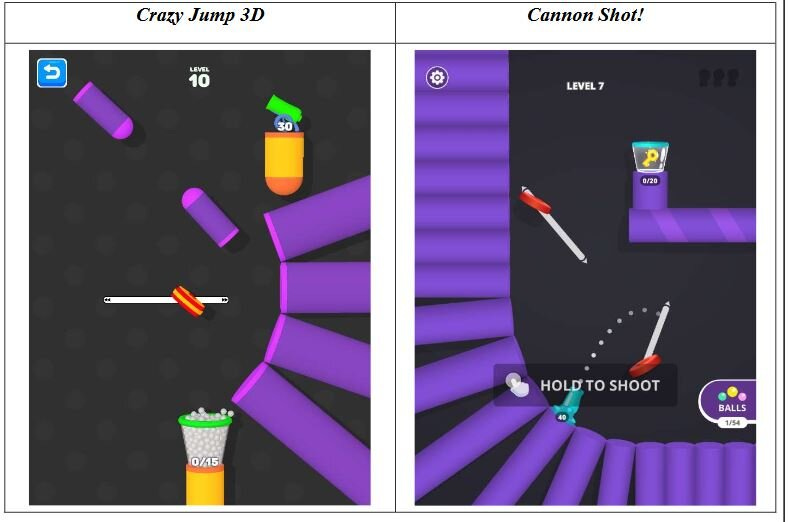District Court Finds that “Passively” Publishing on the Apple App Store Doesn't Create Jurisdiction in California Without “Something More”
BIG PICTURE
A Northern District of California Court announces that it is not the world’s “international court of internet law.” It dismisses a copyright infringement clone case between a Turkish and Belorusian company, even though the allegedly infringing game was distributed in the U.S. on the Apple App Store and on Google Play, and U.S. citizens received ads on Facebook. Did the court make too little of the targeted advertising and intentional distribution to the U.S. market, though? Or get it right?
SETUP
Good Job Games Bilism Yazilim Ve Pazarlama is a Turkish company that developed a mobile game called Crazy Jump 3D, in which the player fires a ball out of a cannon that ricochets off a surface and into a basket. It published both games on the Apple App Store and Google Play on September 29, 2019 and got a copyright registration on November 19, 2019.
Say Games, LLC is a Belarusian company that developed an alleged clone game called Cannon Shot!. On October 18, 2019, one month before Good Job Games received its copyright registration, Say Games began publishing Cannon Shot! on Google Play. On October 26, 2019, Say Games also released Cannon Shot! on the Apple App Store.
On November 14, 2019, Good Job Games sent a DMCA take-down notice to Apple. (Apple presumably then did what it always did and told the parties to work it out among themselves.) Say Games made changes to Cannon Shot! but refused to take down its game.
THE LAWSUIT
On December 3, 2019, Good Job Games filed a copyright lawsuit in the Northern District of California. The complaint alleged copyright infringement. It claimed the Northern District of California had personal jurisdiction over Say Games because Say Games:
(a) conducts extensive and ongoing business with U.S. customers;
(b) purposefully chose to distribute the game in the U.S. through services provided by Apple and Google (both CA companies);
(c) entered into agreements with Apple and Google wherein it agreed to submit to jurisdiction in California for any disputes;
(d) directed its conduct at Good Job Games, knowing it would be harmed in the U.S. and California specifically;
(e) advertises and markets Cannon Shot! in the U.S. and California using Facebook and ironSource Ltd. (both CA companies);
(f) communicates directly with U.S. and California citizens to solicit the use of Cannon Shot!;
(g) entered into contracts with U.S. and California citizens who installed the game and accepted the terms of use; and
(h) collected revenue derived from advertising directed at user in the U.S. and California specifically.
THE ORDER
On May 7, the District Court granted Say Games’ motion to dismiss for lack of personal jurisdiction and denied Good Job Games’ request for leave to propound jurisdictional discovery (also mooting Say Games’ 12(b)(6) motion to dismiss).
The Court explains:
“Under GJG’s theory of jurisdiction, any non-resident entity that elects to distribute a digital product through Apple or Google’s digital marketplace, or utilizes Facebook to advertise the product, expressly targets California, thereby subjecting itself to a lawsuit here. This is so, according to GJG, because Apple, Google, and Facebook are all California-based entities. This Court is not persuaded.”
The Court recognizes that the Ninth Circuit has not squarely addressed if the availability of a downloadable video game subjects a defendant to jurisdiction, but has made clear that operating a passive website alone doesn’t create jurisdiction and that “something more” is needed. Here, however, the Court did not find the “something more” because Cannon Shot! (the alleged infringing game) supposedly had no “specific focus” in California.
COLOR COMMENTARY
The Court agrees with Say Games that “the Northern District of California is not an international court of internet law” and makes it clear that it sees this as a dispute between a Turkish company and a Belorusian company best litigated in Eastern Europe.
When you distribute a game on Apple or Google’s platforms you have to choose to distribute your game in the United States, though, don’t you? Similarly, when you advertise to U.S. or California residents on Facebook, you have to choose to do that — and pay for it, no? For example, you don’t just give Facebook $10,000 and say “please advertise this game to all citizens on earth.” Instead, you have to pay for targeted advertising based on a number of things, including territory.
Isn’t spending money for the purpose of advertising to U.S. or California citizens a “focus” and, perhaps, maybe even a “specific focus”?
The Court does discuss Mavrix Photo, Inc. v. Brand Techs., Inc., 647 F.3d 1218 (9th Cir. 2011). In fact, it discusses the part about selling “advertisements directed to California residents” which, among other things, led to a finding of personal jurisdiction. Here, however, for Good Job Games’ ads, the Court says: “The fact that these advertisements were viewed by Californians does not mean they were targeted at California—they can be viewed anywhere.”
Really? I was under the impression that Facebook made money by segmenting its market so that ads could only be viewed by the people you paid to have view them. That sounds an awful lot like “focusing” on a region.




